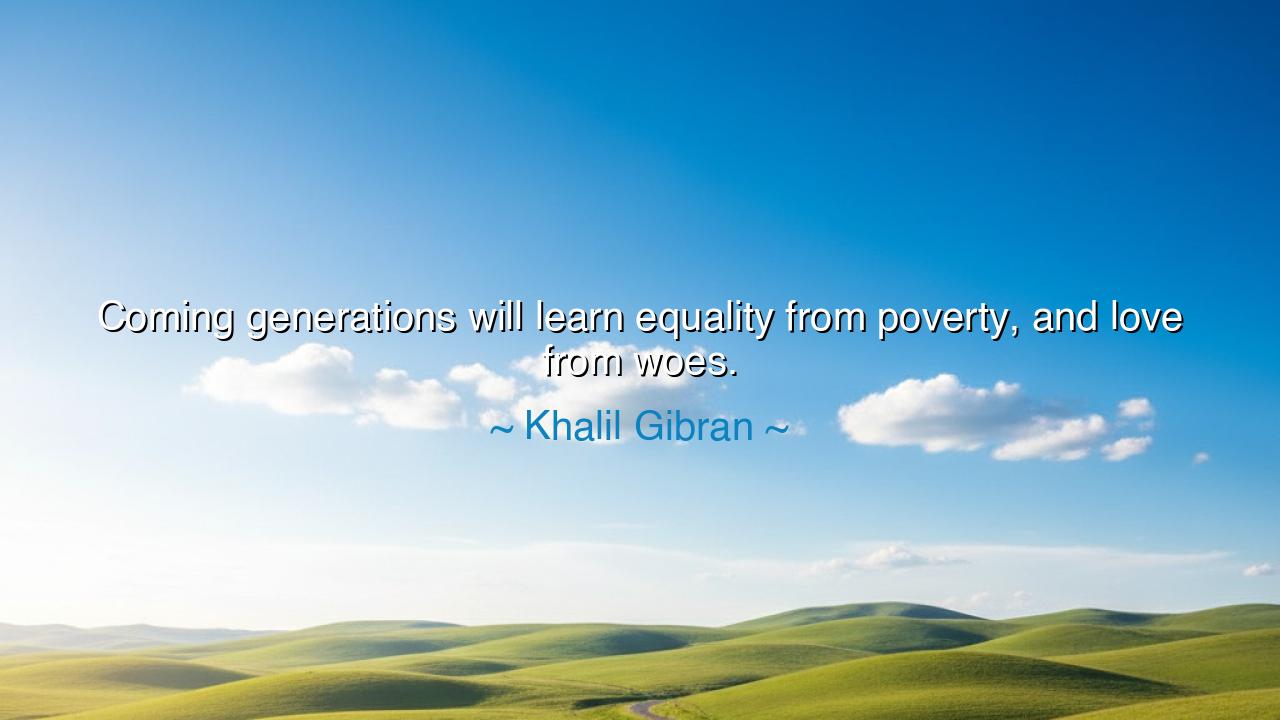
Coming generations will learn equality from poverty, and love






The words of Khalil Gibran—“Coming generations will learn equality from poverty, and love from woes.”—are like a prophecy written in flame and sorrow. In them, Gibran, the mystic poet of Lebanon, unveils the eternal law by which the human soul grows: that wisdom is born not from comfort, but from struggle, and that compassion blossoms not from abundance, but from suffering. His words remind us that hardship, though bitter, is the secret teacher of the heart; it humbles the proud, softens the harsh, and opens the eyes of the spirit to what truly matters. Gibran did not speak these words as a preacher of despair, but as a herald of transformation—the belief that through pain, humanity may yet awaken to justice and love.
The origin of this quote lies in Gibran’s deep reflection on the condition of mankind. He lived through exile, famine, and the dislocation of his homeland, and from these wounds came his insight into the hidden balance of life. In his writings, especially in The Prophet and The Madman, Gibran explored the paradox that the soul’s highest virtues are forged in its darkest hours. He saw that comfort breeds blindness, while suffering breeds vision. Thus, when he declared that “coming generations will learn equality from poverty,” he was not exalting misery but foretelling that only through the shared experience of need will humanity learn its oneness—that in hunger, man sees his brother’s hunger, and in loss, his brother’s grief.
To learn equality from poverty is to realize that beneath the glittering garments of fortune, all hearts beat the same. When abundance divides us, it breeds pride and indifference; when poverty touches us, it tears away illusion. Those who have known want understand the worth of kindness, and those who have felt exclusion understand the sanctity of fairness. Gibran’s words strike at the root of arrogance: he warns that a world obsessed with wealth must one day relearn humility from its own ruin. Just as the tree grows strongest after the storm has stripped its branches, so too will humankind grow wise only when it remembers that greatness lies not in possession, but in compassion.
Consider the tale of Mahatma Gandhi, who walked the earth in the simplest of garments, refusing the luxuries of the powerful. He chose poverty not as punishment, but as a path to equality. Living among the poorest, he learned the pulse of their suffering and the purity of their hearts. From this solidarity arose a force greater than any weapon—the power of truth and love. Gandhi’s revolution was not waged with wealth, but with humility. In him, Gibran’s prophecy took living form: through the shared pain of a nation, India rediscovered its dignity and unity. Thus, poverty became the teacher, and equality the lesson.
And what of the second half of Gibran’s truth—“and love from woes”? The heart learns love not in ease, but in endurance. One who has never wept cannot fully cherish joy, nor can one untouched by loss understand tenderness. The fires of pain burn away selfishness, leaving behind the pure gold of empathy. Through sorrow, we come to see one another not as rivals but as fellow travelers, each carrying burdens unseen. History’s greatest souls—Christ on the cross, Martin Luther King in his cell, Mother Teresa among the dying—did not learn love from peace, but from pain. Their compassion was born from wounds that never closed, yet from those wounds flowed healing for the world.
Gibran’s words also serve as a warning to every age: prosperity breeds forgetfulness. When generations grow up in ease, they forget the lessons of struggle. They speak of equality but build walls of comfort; they preach of love but turn away from need. Thus, life, in its merciful sternness, allows hardship to return—not as punishment, but as correction. Each age must relearn through its own trials that the soul cannot live on luxury alone. It must be refined through poverty of pride and woes of the heart, until it remembers again the sacred kinship of all beings.
So, my child, when hardship visits you, do not curse it. Remember what the wise Gibran taught: pain is the chisel of the divine, carving compassion into the stone of the human heart. Poverty—whether of wealth, of power, or of certainty—teaches us equality by showing that all stand naked before life. Woe teaches us love by breaking the walls that keep us apart. Do not flee these teachers; walk with them, learn from them, and let them shape you into one who sees others not as strangers, but as mirrors of yourself.
And thus, when Gibran proclaims that “coming generations will learn equality from poverty, and love from woes,” he speaks of the alchemy of the human spirit. For out of suffering arises wisdom, and out of wisdom, compassion. The furnace of affliction refines the soul until it glows with the light of understanding. Let this truth be your guide: embrace hardship not as an enemy, but as a mentor, and out of it will bloom the noblest of virtues—the love that makes all souls equal, and the equality that makes all love divine.






AAdministratorAdministrator
Welcome, honored guests. Please leave a comment, we will respond soon